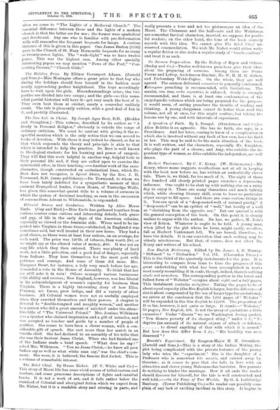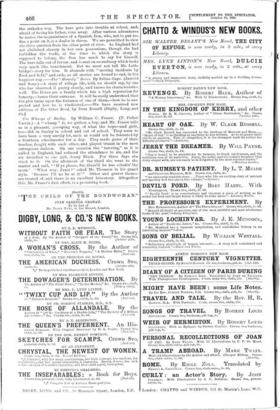Brenda's Experiment. By Sur g eon-Major H. M. Greenhow. (Jarrold and Sons.)—This
is a story of the Indian Mutiny, the plot being complicated with the private fortunes of the young lady who tries the "experiment" She is the daughter of a Professor who is somewhat tete montee, and carried away by theories ; so it comes to pass that she falls in love with an attractive and clever young Mahommedan barrister. Her parents do nothing to hinder the marriage. How it all ends the reader should discover for himself, for the tale is well constructed and well told.—On the Verge of Two Worlds. By G. A. Lethbridge Banbury. (Tower Publishing Co.)—No reader can possibly com- plain of any lack of exciting incident in this story. It begins in the orthodox way. The hero gets into trouble at school, and, afraid of facing his father, runs away. After various adventures he makes the acquaintance of a Spanish Don, who, not to put too fine a point on it, is a dealer in slaves. We are permitted to view the slave question from the other point of view. As England had not abolished slavery in her own possessions, though she had forbidden the trade, at the time to which the story is supposed to belong, the Don has much to say for himself. The hero falls out of favour, and is sent on an embassy which looks very much like banishment. But we must not tell Mr. Leth- bridge's story for him. It abounds with "moving incidents by flood and field," and ends, as all stories are bound to end, in the happiest way.—The" Honesty" Doves. By Selina Gaye. (Jerrold and Sons.)—A story of village life, told, we should say, by one who has observed it pretty closely, and knows its characteristics well. The Doves are a family which has a high reputation for honesty,—hence their surname. It will be easily understood that the plot turns upon the fortunes of one of them,—how he is sus- pected and how he is vindicated.—We have received new editions of The Other Bond, by Dora Russell (Digby, Long, and Co.)



















































 Previous page
Previous page